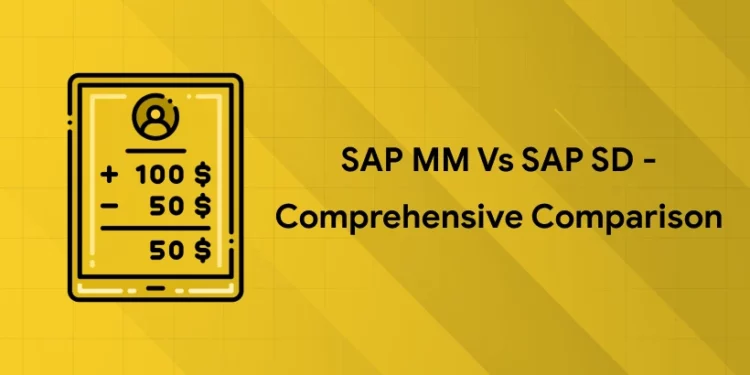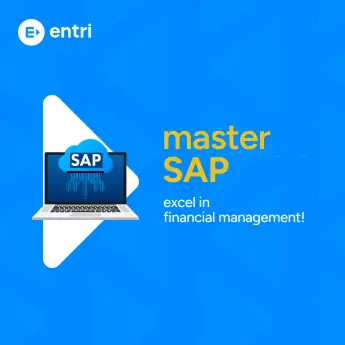Table of Contents
SAP SD (Sales and Distribution) covers enterprise functions along with enquiries, quotations, order control, credit memos and debit memos. This includes handling cut price and export sales. If you have studied advertising, income and distribution era or channel control, the SAP SD module is an ideal preference. SAP SD modules had been followed through a big range of agencies global.
SAP materials management covers business capabilities which includes procurement or buying and inventory control. Supplies can be substances or offerings and can be locally sourced or imported (sourced overseas). Almost all fundamental manufacturing and distribution groups implement SAP using the SAP MM module. Becoming a terrific SAP MM expert is ordinarily approximately expertise the commercial enterprise strategies concerned in cloth control.
Join Entri’s SAP MM Training Course today!!
What is SAP MM?
SAP mm SAP ECC (ERP Central Component) is an important module that provides inventory, materials and inventory management to organizations with functionality. SAP mm shall ensure that all material is stored in the right place at the right time, and the correct amount in the organization. SAP mm ensures that there is no possibility of a reduction or supply interval in the organization’s supply chain. This helps warehouses, inventory and other professionals in the supply chain to buy raw materials and goods in a cost -effective way.
Now a days in the organizations, material management is the one of the biggest challenges . SAP MM helps organizations strengthen supply chain, inventory and warehouse management with full control over employees, machinery and materials. By applying SAP MM in organizations, they can streamline supply chains, production lines, and logistics to deliver materials to customers cost-effectively. SAP MM is the core module of the SAP ECC logistics function and supports, among others, production planning (PP), factory maintenance (PM), sales and distribution (SD), human capital management (HCM), and quality management (QM).
What is SAP SD?
SAP SD is a module that can be used to store customer data and product related to product. This module is part of the logistics functionality of SAP ERP Central Component (ECC) and is fully integrated with SAP Material Management (MM) and SAP Production Scheme (PP). The SAP SD module has underdeveloping suppliers and customer database, invoicing, shipping, credit management and Challan.
SAP SD works with different modules to start an order-to-contain business process cycle. Sales and delivery manage all the details that are part of this cycle. In a regular cycle, SD creates a sales price and the customer gives an order. After the order is confirmed, the products are sent from the production site or warehouse to the customer’s location. An invoice will also be sent with your order and our accounting team will pay. Each step of this process records transactions that lead to multiple transactions in other modules.
Master SAP with Expert-Led Courses
Unlock your potential with our comprehensive SAP courses! Learn essential modules like SAP MM (Materials Management), SAP SD (Sales and Distribution), and SAP FICO (Financial Accounting and Controlling) from industry experts.
Know MoreSAP MM — Managing Procurement & Inventory Like a Pro
The Material Management (MM) module acts as the warehouse manager of the Digital Enterprise System. This enables optimal procurement, systematic inventory management and accurate costing.
MM meets all your material needs, so your production and sales can stay on track without interruption. It is supported by sub-modules such as Inventory Management (IM), Purchasing (MM-PUR), Invoice Validation (MM-IV) and Valuation (MM-VAL).
Comprehensive Procurement Management
The purchasing department is an important entity in any company. In order to reduce production costs, it is important to provide smooth raw materials at an optimal price.
By using the SAP MM module, companies can reduce non-conventional costs and introduce procurement discipline in the following ways:
Vendor Master Data Management Centrally record all supplier details, including pricing, contracts, material supply and quality control compliance. This enables informed supplier selection and policy compliance.
An electronic approval chain based on purchase requisition rules for all purchase orders prior to shipment provides transparency, control and cost visibility.
Automation of purchase to payment
Inquiry to Payment Integration – Simplify quoting, purchase order, pick-up, invoice confirmation and payment.
Procurement and Contract Management Provisions for complex contract creation and management with competitive bidding, price analysis, e-auctions, master purchase contracts, and alert expiration tracking for seamless procurement.
MM enables deep peer-to-peer (P2P) processes to procure goods and services at optimal cost with full compliance and minimal overhead.
Accurate Inventory Planning & Tracking
Accurate inventory management is vital in lean manufacturing. Companies are forever faced with the dual challenge of dealing with working capital tied up in inventory while avoiding production interruptions due to inventory shortages.
MM provides complete inventory visibility with tracking and scheduling capabilities.
The main features are:
Comprehensive master data of material codes assigned to all materials. They are differentiated as raw materials, work in progress and finished products. Integrate details such as expiration dates and storage conditions for each product.
Multiple dependent inventory types support inventory types such as blocked inventory, goods in/out, and goods in quality inspection, with automatic posting between types on trigger events.
Paged multi-level batch/serial number tracking follows the complete sequence of component consumption down to the BOM (bill of materials) produced material code.
Inventory Forecasting and Optimization Statistical time series forecasting models provide data for optimal reorder quantity and scheduling calculations, enabling high service levels while minimizing capital lock-up.
With 360-degree inventory visibility and planning intelligence, companies can avoid working capital and inventory traps, support lean and just-in-time production, and maintain high service levels.
Precise Cost Accounting & Valuation
Accurate material costing is essential, but difficult due to volatile supply markets and complex manufacturing cost streams. The MM module provides robust assessments for various industries and inventory scenarios.
Valid key accounting activities:
- Land costing: first in, first out, moving average method, standard costing
- Supporting by-products, spin-offs and co-productions
- Periodic automated postings: Accounts Payable, Accounts Receivable, Shipping, Amount Adjustments
- Reconciliation of multiple valuations: group reporting currencies, profit center valuations
MM tightly integrates procurement, inventory, production and general ledger functions, allowing businesses to achieve a single version of the truth through accurate cost accounting.
Benefits of the SAP MM Module
- Reduce Unauthorized Costs: Complete cost visibility through managed procurement processes reduces non-contractual costs by 40-60%.
- Reduced inventory costs: Accurate management of reorder cycles reduces working capital requirements by 25-35% and frees up cash flow.
- Inventory minimization: Accurate inventory tracking and planning reduces inventory by 50-70% and supports a lean supply chain.
- Cost Optimization: Integrated invoice validation eliminates duplicate payments and errors and increases profitability.
The SAP MM module gives companies complete control over the two largest operating costs: purchase of goods/services and inventory carrying costs. By bridging the gap between buyers and suppliers, production and finance teams, you create massive operational efficiencies.
| SAP Courses Offered | |
| SAP FICO Course | SAP MM Course |
Managing End-to-End Order Fulfillment with SD
Sales and Distribution (SD) streamlines your order-to-cash process, enabling customizable order management, global trade capabilities, batch/pipeline split billing, and integrated personalized customer service.
SD functions such as quoting, order processing, shipping, invoicing and collections are supported by specialized capabilities for pricing, taxation, credit risk and communication with logistics systems.
Adaptable Order Management System
Although order processing sounds simple in principle, transactions between global businesses are complex because quantities, delivery dates, and customizations can change endlessly across multiple categories in factories, warehouses, and regions.
SD allows you to configure a customized order processing system:
- Item category: service, type, or custom item
- Sales documents: quotes, contracts, scheduling agreements
- Fulfillment scenarios: drop shipping, cross-docking, and bundled components
- Pricing terms: volume band, royalty discount
- Tax calculation: VAT, GST, Interstate
- Credit risk coverage: verification, insurance, factoring
This flexible range and workflow-based approvals enable an agile order management process, reduce lead times and increase sales conversions.
Integrated Delivery and Logistics Tracking
For tangible goods, order fulfillment remains incomplete until the goods have been delivered and require integration with a logistics provider.
SAP SD allows you to:
- Electronic data exchange with package/courier systems
- Send the subject of the goods for the delivery document
- Tracking dashboard and delivery history certificate
- Automatic invoicing with delivery confirmation trigger
When a sales promise is fulfilled by outbound logistics, the exact inventory deduction is performed and the order fulfillment loop is closed.
Accelerated Billing, Receivables & Collections
Errors and inefficiencies in billing and revenue leakage in collections have a significant impact on cash flow and working capital requirements.
SD seamlessly combines order management data with financial functions.
- Sales invoice: consolidated, structured or periodic based on goods
- Discount payment: out of invoice or credit note
- Payment processing: digital channels, payment gateways
- Dunning and accounts receivable management
- Revenue Reconciliation: Contract Tracking
In this way, SD completes the order-to-cash stage in an interconnected digital process that spans multiple departments and provides a consolidated view of outstanding debtors.
Benefits of Sales Management with SAP SD
- Improved customer experience: improved on-time delivery rates and order flexibility
- Faster invoice processing: Reduce invoicing time by 40-50% with touchless order-to-invoice processes.
- Lower DSO: Process transparency builds customer trust and reduces DSO by 30-40%.
- Increase sales productivity: Uniform order processing increases conversion rates by 15-25%.
These metrics are directly aligned to accelerating revenue and business profitability, making the SAP SD module the driving force behind the end-to-end sales experience for your company.
Integrated Automation Powering Profits
Material sourcing, manufacturing operations, and order fulfillment are the main engines that drive a company’s profitability. SAP’s MM, PP, and SD modules enable digitally integrated processes to run critical aspects of the sales cycle, from demand signals to cash collection, like clockwork.
The biggest advantage is probably indirect. Free your front-line employees from manual coordination clutter and free them to focus on more valuable analytics, customer service, and business activities, making your fast-growing flywheel spin faster.
This post covers the basics of the features and benefits of MM, PP, and SD, but their real power comes from their end-to-end integration as a digital core. Traditional practices may need to be overhauled and management investments may need to change, but as operating margins increase and sales accelerate year over year, companies will find it worth the effort.
Join Entri’s SAP MM Training Course today!!
Differences between SAP SD and SAP MM
There are several factors that differentiate SAP FICO from SAP MM. These differences are based on the following:
Scope and Functionality:
SAP MM: SAP MM is a specialized module for material management in an organization. Facilitate the purchasing process by managing purchase requisitions, purchase orders, and vendor management. The module also manages inventory management, allowing organizations to track inventory levels, perform stock valuations, and manage material movements. SAP MM includes a vendor evaluation feature that allows companies to evaluate and evaluate suppliers based on performance metrics. Finally, it enables a seamless goods receipt and issue process and ensures accurate tracking of material movement throughout the supply chain. The combination of these functions helps in the efficient management of materials and logistics operations.
SAP SD: SAP SD specialists ultimately play an important role in developing details and requirements. Implementation of product requests to supply chain processes. Manage complex sales/business cycles and various movements related to packaging setup, shipping and delivery. The starting salary for a new SAP SD specialist with SAP SD certification is approximately 40,000. SAP SD is widely used in various industries and businesses continue to choose it due to its wide range of features and benefits. It requires skilled people with proper knowledge of SAP SD. Also, check that the person is certified in their skills and check if the person has received SAP SD training.
Areas of Application:
SAP MM: SAP MM is particularly relevant for organizations dealing with procurement, manufacturing or any form of material management. Commonly used in manufacturing, retail, logistics and distribution industries. SAP MM streamlines the procurement process and ensures timely availability of materials, optimal inventory levels and cost-effective purchasing.
SAP SD (Sales and Distribution): SAP SD is the core functional module of SAP ERP ECC that enables organizations to store and maintain customer and product related data. Businesses use this data to manage all orders, shipping, billing and invoicing for products and services. The main operations performed by these modules include customer order processing, pricing, picking, packing, shipping, invoicing and risk management in SAP SD.
- Pre-sale measures include inquiry and price preparation.
- Sales order processing, i.e. creating a sales order (SO).
- Shipping (including creation of shipping documents).
- Billing takes into account both billing documents and invoice creation.
Integration and Interdependencies:
SAP MM: Similarly, SAP MM integrates with other SAP modules to enable end-to-end procurement and inventory management. It integrates SAP Sales and Distribution (SD) for order processing, SAP Production Planning (PP) for material requirements planning, and SAP Warehouse Management (WM) for efficient inventory management. To better understand these integrations and interdependencies, enroll in the best SAP MM training. This integration facilitates the smooth flow of information throughout the supply chain, from sourcing to manufacturing to delivery.
SAP SD: SAP SD is more than a standalone system. The ability to integrate with different modules and systems helps. Connecting customer data, order management and fulfillment processes in SAP SD promises to improve the customer experience.
Elevate your career with SAP SD course! Get exclusive offers!
User Roles and Responsibilities:
SAP MM: It is an important tool for procurement professionals, inventory managers and supply chain professionals. These users use SAP MM to efficiently create and manage purchase orders and ensure timely provision of goods and services. Use this module to build and maintain vendor relationships and facilitate effective communication and negotiation. SAP MM helps monitor inventory levels and allows users to optimize inventory management and prevent stockpiling and overstocking. Supports the material evaluation process and accurately tracks costs and values associated with purchased materials. Finally, SAP MM enables users to streamline procurement cycles, track goods movement and optimize inventory across multiple locations.
SAP SD:
• Facilitate SAP SD implementation and support.
• Provide appropriate system solutions and perform detailed analysis of complex business process requirements. Interpret, Identify, validate and document customer requirements
• Facilitate workshops to gather business requirements.
• Map the customer’s business needs, processes and goals. Makes necessary modifications to the product to meet customer needs.
• SD design, customization, configuration, and testing.
• Identify gaps, problems and work on solutions.
• Act as a liaison with customers regarding troubleshooting to investigate, analyze and resolve software issues.
• Make quick changes and transitions as needed for high priority issues.
• Document functional design, test cases, and results.
• Actively identify and propose improvements to business processes and systems.
• Providing consulting services for new implementation and existing support projects.
• Act as liaison between business and technical teams.
• Provide ad hoc user support and training as needed.
• Work autonomously and independently. May act as subject mentor for younger members
Join Entri’s SAP MM Training Course today!!
| Also Read | |
|---|---|
| SAP FICO vs SAP MM: Which is Right for You? | SAP SD vs SAP FICO |
| Tally vs SAP | Difference Between SAP FICO and SAP HANA Finance |
| SAP CRM vs SAP SD | |
Master SAP with Expert-Led Courses
Unlock your potential with our comprehensive SAP courses! Learn essential modules like SAP MM (Materials Management), SAP SD (Sales and Distribution), and SAP FICO (Financial Accounting and Controlling) from industry experts.
Know More











